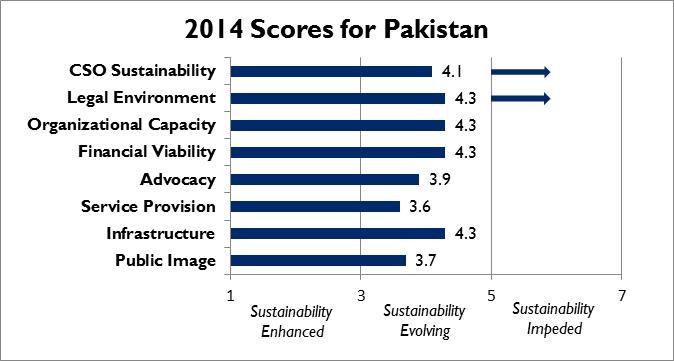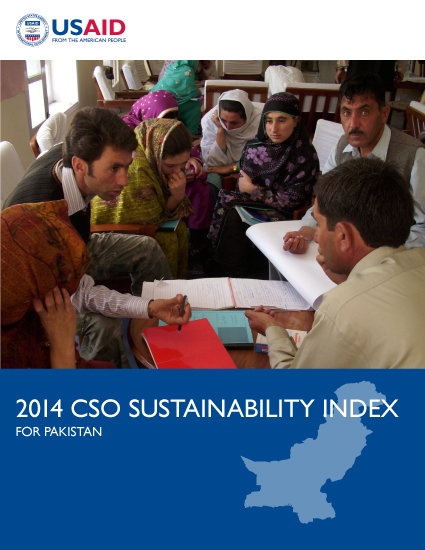- What We Do
- Agriculture and Food Security
- Democracy, Human Rights and Governance
- Democracy, Human Rights and Governance Strategy
- Supporting Free and Fair Elections
- Supporting Vibrant Civil Society & Independent Media
- Protecting Human Rights
- Promoting Accountability & Transparency
- Importance of Democracy, Human Rights, & Governance to Development
- Countering Trafficking in Persons
- Economic Growth and Trade
- Education
- Ending Extreme Poverty
- Environment and Global Climate Change
- Gender Equality and Women's Empowerment
- Global Health
- Water and Sanitation
- Working in Crises and Conflict
- U.S. Global Development Lab
Background & Approach
2014 CSO Sustainability Index (CSOSI) for Pakistan ![]() (pdf - 3 MB)
(pdf - 3 MB)
The 2014 CSO Sustainability Index (CSOSI) for Pakistan looks at the sustainability of the civil society sector based on an assessment by local civil society representatives and experts. The CSOSI is an important tool for civil society organizations (CSOs), governments, donors, and academics for understanding and measuring the sustainability of the CSO sector. This publication complements other editions of the CSOSI which together now cover 70 countries and territories in Central and Eastern Europe and Eurasia, Sub-Saharan Africa, the Middle East and North Africa, Asia, and Afghanistan. The Index scores seven interrelated dimensions of CSO sustainability: Legal Environment, Organizational Capacity, Financial Viability, Advocacy, Service Provision, Infrastructure, and Public Image. These scores are averaged to produce an overall score for CSO sustainability. Details of the methodology can be found here.
Findings
It is difficult to assess the magnitude of civil society in Pakistan, as there is no comprehensive database of CSOs and a large number of CSOs remain unregistered. According to a statement by the Minister of Social Welfare and Special Education in 2010, there were approximately 100,000 CSOs and community-based organizations (CBOs) operating in the country, 60,000 to 70,000 of which were registered. At the same time, preliminary findings of a mapping study being conducted by the Pakistan Centre for Philanthropy (PCP) suggest that at least 80 percent of registered organizations are inactive, indicating that the number of active registered CSOs in the country is much smaller.
The year 2014 was tumultuous in Pakistan. Floods, drought, sectarian clashes, and security crises created severe challenges during the year. The country also experienced political and economic setbacks, including power outages, dwindling investments, protests, and the resignation of the government. CSOs rose to these challenges by extending aid in the affected regions, and seeking to help persons internally displaced by events. While service delivery CSOs were most involved in such efforts, even rights-based organizations responded to relief needs during these trying times.

In 2014, there continued to be a significant gap in capacity between larger foreign-funded CSOs and local small and medium-sized or grassroots organizations, with the former generally having well-defined boards, annual reports, and standard office equipment, and the latter often being “one-man shows” that operate on an ad hoc basis. CSOs have a weak public image, which hindered their capacity to raise funds locally, and CSOs depended primarily on donor funding. Despite the fact that CSOs largely lack the capacity to raise local funds and donor priorities do not necessarily align with CSOs’ missions, CSOs generally had enough resources to remain viable in the short-term in 2014. CSOs—both those engaged in advocacy and those that provide services—have direct, but limited, lines of communication with policy makers, and CSOs continued in 2014 to conduct advocacy on various issues and campaign on a large scale, including through social media.
The government recognizes the role of CSOs in promoting the welfare of the country, and has launched various initiatives to encourage philanthropic activities to fund CSOs, especially through corporate social responsibility (CSR). At the same time, the relationship between CSOs and the government remained tense, particularly where CSOs needed permission from the military to operate due to security concerns, and the legal environment for CSOs in Pakistan remained complex in 2014.








Comment
Make a general inquiry or suggest an improvement.